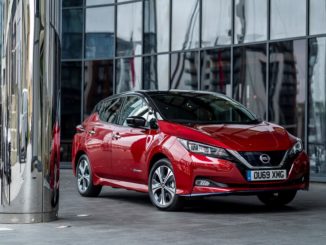Fonte: SmartWitness
Londra, Gran Bretagna. 24 Maggio 2016. La metà degli automobilisti si oppongono all’auto senza conducente, mentre la Gran Bretagna prende la pole position nello sviluppo di veicoli a guida autonoma, secondo un nuovo sondaggio.
Il 62% dei conducenti ha detto che si sentirebbe meno sicuro sulle strade insieme ad altri veicoli con nessun essere umano al volante.
Quasi tre quarti degli intervistati (72%) ha detto che ci sarebbero complicazioni aggiunte alla soluzione delle controversie tra le assicurazione che coinvolgono l’auto ‘robot’.
I nuovi risultati – da una nuova indagine dagli specialisti CCTV SmartWitness tra 1.000 automobilisti – ha rivelato come il governo ha reso lo sviluppo di “veicoli autonomi ‘ una parte fondamentale del Discorso della Regina.
 La Regina ha detto che misure nel Modern Transport Bill avrebbero ‘assicurano il Regno Unito di essere all’avanguardia nella tecnologia per le nuove forme di trasporto, compresi i veicoli autonomi ed elettrici.’
La Regina ha detto che misure nel Modern Transport Bill avrebbero ‘assicurano il Regno Unito di essere all’avanguardia nella tecnologia per le nuove forme di trasporto, compresi i veicoli autonomi ed elettrici.’
Gli automobilisti potrebbero acquistare e guidare le auto robot già nel 2020 con le prime prove sulle strade della Gran Bretagna che dovrebbero iniziare il prossimo anno – a partire dalle strade locali ed estendendo gradualmente estese alla rete autostradale.
C’è ancora grande incertezza sulla nuova tecnologia con gli automobilisti che richiedono forti salvaguardie per assicurare che ci sia un ‘playing field level’ con le assicurazioni che coinvolgono i veicoli autonomi.
Nove su dieci (91%) sostengono l’introduzione obbligatoria della tecnologia delle telecamere in tutti i veicoli autonomi così non ci sarebbero dubbi in tribunali riguardo la prova ammissibile per sapere esattamente quello che è successo in caso di incidente.
Il sondaggio SmartWitness ha trovato che il 52% degli automobilisti si oppongono all’introduzione di auto senza conducente – soprattutto per i timori circa la sicurezza stradale.
L’amministratore delegato SmartWitness Paul Singh ha detto:
“E’ incredibilmente eccitante che la Gran Bretagna sia in prima linea a livello mondiale nello sviluppo di automobile a guida autonoma.
“Ma questi nuovi risultati del sondaggio SmartWitness mostrano che ci sono ancora veri e propri timori dai normali automobilisti su cosa accadrà se si trovano in una collisione con un veicolo autonomo.
“Circa il 40% di tutti i crediti di assicurazione sono in discussione, ma come si fa a risolvere una controversia, quando si può ascoltare solo la prova da uno dei conducenti coinvolti?
“Il modo più semplice per eliminare il problema è quello di rendere obbligatoria la tecnologia della telecamera in tutti i veicoli autonomi. Ciò fornirà al tribunale la prova ammissibile in caso di incidente e contribuirà ad alleviare i timori degli automobilisti circa l’introduzione di auto senza conducente.
“E’ fantastico che il governo abbracci questa nuova tecnologia e la spinga in avanti, ma opportune garanzie devono essere messe in atto per proteggere tutti gli automobilisti.”
Solo il 2% degli incidenti registrati sulle telecamere di SmartWitness sono risultati in casi controversi.
Le telecamere sul cruscotto sono ora utilizzate in più della metà delle flotte della Gran Bretagna, secondo l’associazione del trasporto stradale.
Un numero crescente di automobilisti privati utilizzano anche loro di guardia contro i truffatori del “cash for crash” riducendo i premi assicurativi.
Il ministro dei Trasporti Patrick McLoughlin ha detto che le auto senza conducente ‘potrebbero sembrare come qualcosa di fantascienza, ma il potenziale economico della nuova tecnologia è enorme e sono determinato perchè il Regno Unito ottenga il massimo beneficio.’
Nissan ha detto che dal 2017 costruirà suoi SUV Qashqai equipaggiati con la tecnologia auto-guida nella sua fabbrica di Sunderland.
In English
Half of UK’s motorists oppose driverless cars
Source: SmartWitness
London, UK. 24th May 2016. Half of motorists oppose driverless cars as Britain takes pole position in the development of self-driving vehicles, according to a new survey. And 62% of drivers said they would feel less safe on the roads alongside other vehicles with no human behind the wheel.
Almost three-quarters of those surveyed (72%) said there would be added complications to resolving insurance disputes involving ‘robo cars.’
The new findings – from a new survey of 1,000 motorists by vehicle CCTV specialists SmartWitness – were revealed as the Government made the development of ‘autonomous vehicles’ a key part of the Queen’s Speech.
The Queen said measures in the Modern Transport Bill would ‘ensure the UK is at the forefront of technology for new forms of transport, including autonomous and electric vehicles.’
Motorists could be buying and driving robo cars as early as 2020 with the first trials on Britain’s roads due to start next year – starting on local roads and gradually extending to the motorway network.
There is still great uncertainty over the new technology with motorists calling for strong safeguards to ensure there is a ‘level playing field’ with insurance claims involving autonomous cars.
Nine out of ten (91%) support the compulsory introduction of camera technology in all autonomous vehicles so there would be court admissible proof of exactly what had happened in the event of an accident.
The SmartWitness poll found that 52% of motorists oppose the introduction of driverless cars – mainly over fears about road safety.
SmartWitness chief executive Paul Singh said: “It is incredibly exciting that Britain is taking the lead globally in the development of autonomous cars.
“But these new findings from the SmartWitness survey show that there are still real fears from ordinary motorists about what will happen if they are in a collision with an autonomous car.
“Around 40% of all motor insurance claims are disputed, but how do you resolve a dispute when you can only hear evidence from one of the drivers involved?
“The simplest way to eliminate the problem is to make camera technology compulsory in all autonomous vehicles. This will provide court admissible proof in the event of an accident and help to alleviate motorists’ fears about the introduction of driverless cars.
“It is fantastic that the Government is embracing this new technology and powering forward, but proper safeguards need to be put in place to protect all motorists.”
Just 2% of accidents recorded on SmartWitness cameras result in disputed claims.
Dashboard cameras are now used in more than half of Britain’s fleets, according to the Road Haulage Association.
Increasing numbers of private motorists are also using them to guard against ‘cash for crash’ fraudsters and reduce insurance premiums.
Transport Secretary Patrick McLoughlin said that driverless cars ‘might seem like something of science fiction, but the economic potential of the new technology is huge and I am determined the UK gets maximum benefit.’
Nissan has said that from 2017 it will build its Qashqai SUVs equipped with self-driving technology at its giant Sunderland factory.
no images were found




Be the first to comment